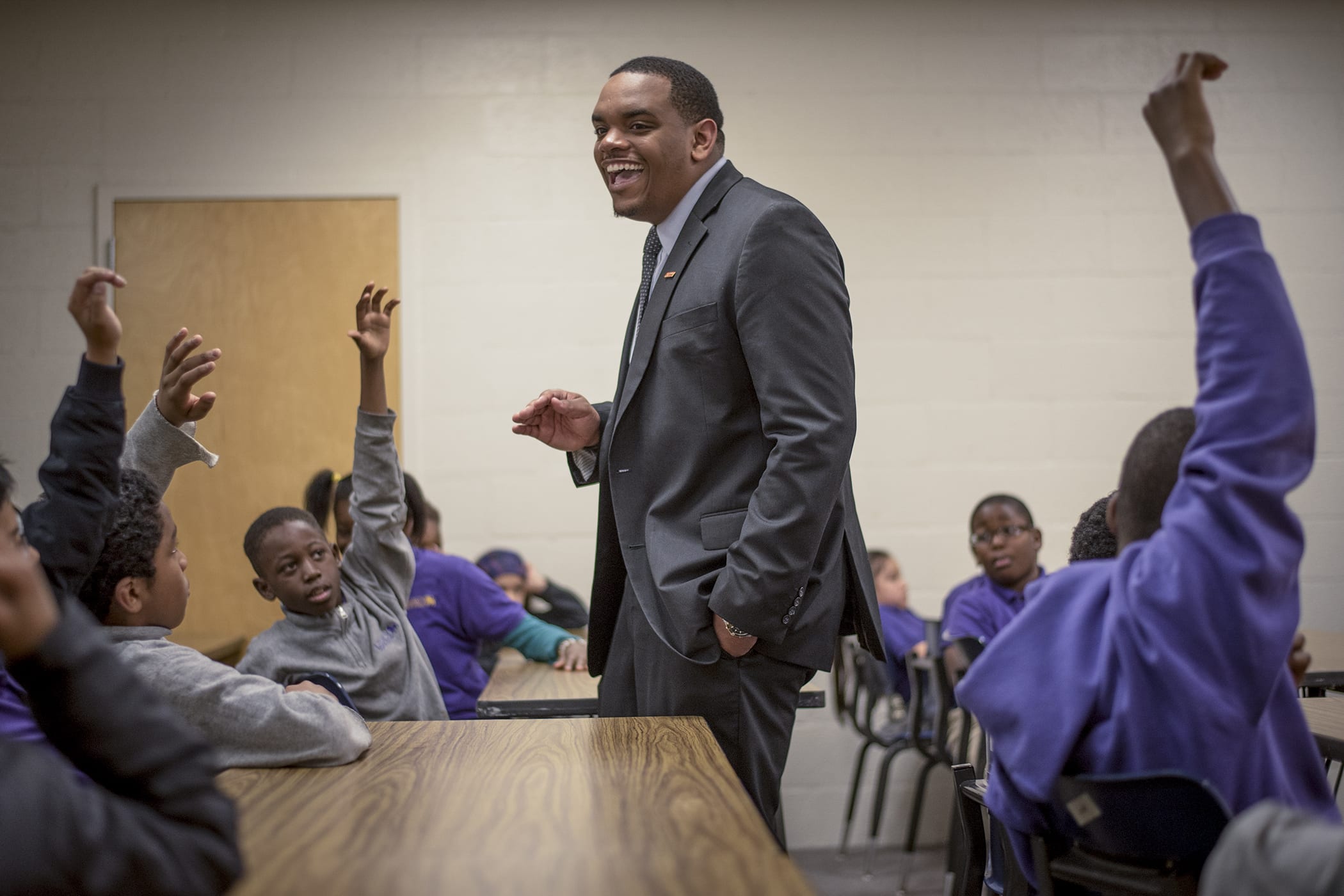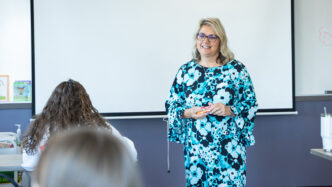African American men make up 2 percent of the teachers in the U.S. In South Carolina, 25 percent of all first-year teachers hired for the 2017-2018 academic year are no longer teaching in South Carolina schools.
Call Me MISTER® has spent the last 20 years working to change those statistics. The program works to increase the pool of available teachers from more diverse backgrounds, particularly among the lowest-performing elementary schools. What started as a single program at Clemson University is now at 25 participating institutions in nine states.
And their work is moving the needle.
Ninety percent of students in the Call Me MISTER program come from South Carolina public schools — and a staggering 85 percent of graduates are still teaching in them, often in Title 1 schools. If MISTERs leave the classroom, it’s usually to become administrators as 36 alumni have.
Of the 278 MISTERs who have graduated from the program in South Carolina, 42 have been named Teachers of the Year by their schools.
MISTERs arrive. They stay. They thrive.

Cameron Brice is an educator-turned-administrator and alumnus of Call Me MISTER who has enjoyed 10 years working in South Carolina schools. Brice, who is now an administrative assistant at A.J. Whittenberg Elementary School in Greenville, says he has a unique view of the program during this milestone.
He remembers seeing the program’s upward trajectory while he was a Clemson student and experiencing it right in the middle of its existence. He recalls feeling the pressure of living up to the students who were in that inaugural class, the ones that appeared on “Oprah” and made people stand up and take notice. He’s also seen just how far the program has expanded in the 10 years since he graduated Clemson and how its network of students and alumni have spread across South Carolina and the nation.
Brice said the program continues to work because of the good kind of pressure it applies.
“Call Me MISTER is a brotherhood, and you don’t want to be the guy who drops the baton,” Brice said. “My cohort wanted to do everything we could to continue the legacy, and I think every cohort since has felt the same. You see so many alumni out there being successful and achieving great things, so you don’t have an excuse not to be successful yourself.”
Brice said a big reason MISTERs stick around is because of that pressure, but also because of the support system that comes along to balance it out. Evan Livingston, a current elementary education major and junior at Clemson University, says the structures of support that define the program is what has continued to stand out to him. That support system is now older than he is, so he happily takes advantage of it.

“One of our tenants is to be your brother’s keeper, so we’re all there for each other to hold one another accountable,” he said. “I received so much support and great advice from the upperclassmen MISTERs when I was a freshman that it almost made me a little too cocky going into my sophomore year.”
Livingston said the ongoing discussions with MISTER leadership and teachers in the field quickly grounded him. MISTERs are out in the community all year long working with youth and convening with fellow students to learn more about their chosen field in order to get perspective. He said he’s constantly reminded that there’s a great deal more he needs to know to be ready to lead his own classroom.
Maintaining the network of MISTERs and providing a time and place for them to exchange ideas and experiences has been a top priority for Dr. Roy Jones, executive director of the Call Me MISTER program, and the many MISTER site coordinators from partner schools. The program’s summer leadership institute provides this time for MISTERs to meet not only one another, but leading voices in the field of education.
Livingston said these experiences are invaluable to him and his fellow MISTERs. They get a sense of context about their profession and the history of minority teachers in the classroom, but they also get a preview of some of the hurdles that first-year teachers are experiencing and overcoming.
“It’s comforting to know that even if I don’t know them personally, there will be a MISTER somewhere nearby or on the phone that I can reach out to if I need them,” Livingston said. “I always know there will be someone there to provide support and advice once I’m working in the profession and no longer at Clemson.”
Broadening the scope
The lasting effects of the Call Me MISTER program aren’t lost on administrators and educational leaders across the state. It’s one of the many innovative programs for which Clemson’s College of Education has become known across the state. Mike Brenan, chairman of the State Board of Education, said he is happy to see that MISTER has gone from an innovative program to a statewide model that is changing lives for teachers and students.

Jones always wanted to broaden the program’s scope, and the best practices from 20 years of Call Me MISTER helped conceptualize the South Carolina Center for the Recruitment and Retention of Diverse Educators, of which Jones is also director. The lessons learned in MISTER are now being applied through the center to catch the attention of minority students interested in teaching at an early age so that rural and underserved districts can “grow their own” educators.
Molly Spearman, South Carolina superintendent of education, has seen the ripple effect of the work started by Jones and championed by a growing network of MISTERs taking the lead of classrooms and entire schools across the state.
“Call Me MISTER provides a pathway for students from historically underserved communities to attend college and pursue a teaching degree,” Spearman said, “but it also nurtures diversity in our state’s teaching force and continues to inspire the next generation of learners to follow in their mentors’ footsteps by becoming MISTERs.”
During every summer leadership institute, signature black blazers are bestowed upon graduating MISTERs. Jones says it’s more than a garment; each blazer represents a chipping away of the stock idea of what a teacher has traditionally been and what it traditionally should be.
But even he is continually surprised by how far the program has come and what it has come to mean for the men who emerge from it. He’s not alone. Brice says the program didn’t stop revealing things to him when he slipped on that blazer, and he doesn’t expect it to stop anytime soon.
“When I was at Clemson, MISTER did things for me that I didn’t even realize at the time,” Brice said. “When I got married and became a father, it helped me be a better man. It made me realize that MISTER is successful because it’s a lifestyle. It’s in my heart and my mind and my passion, so I couldn’t leave it if I tried.”







